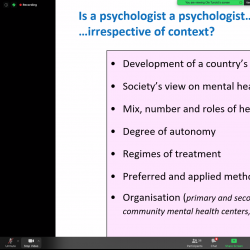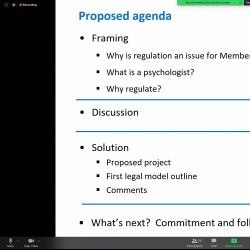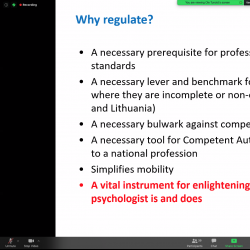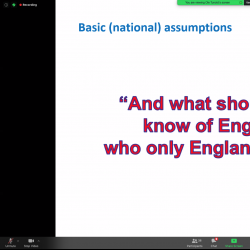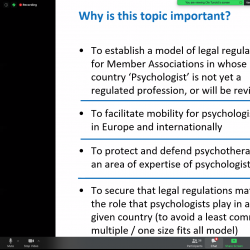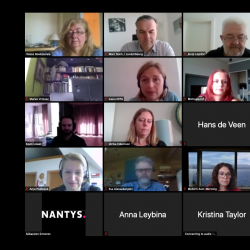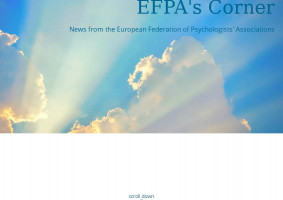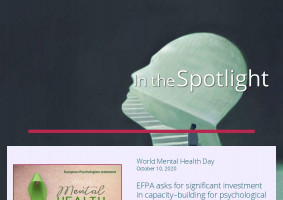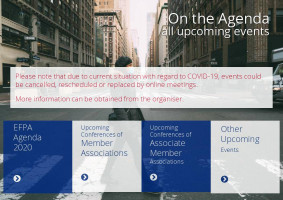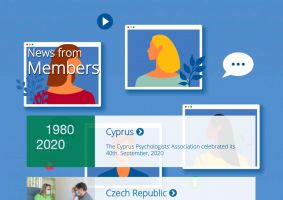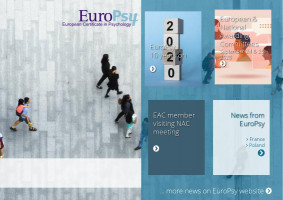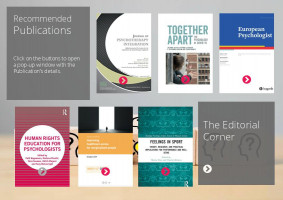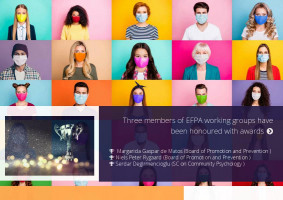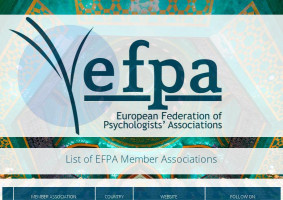Welcome to the EFPA News Magazine, the magazine that was established for the exchange of all relevant news and information among our member associations.
In this edition, we follow closely (and support) corona-related events in Psychology, such as the international online-conference “Role of Psychology in fighting COVID-19 pandemic: International perspective”, a call for papers for European perspectives on the pandemic in a special issue of European Psychologist, and EFPA’s VP Nicola Gale highlights a European coronavirus pandemic survey on how psychology associations ourselves have been faring during the pandemic that was held by the International Union of Psychological Science (IUPsyS), of which the results can be read on the EFPA Psychologists' Support Hub.
Also, we present a lot of other mental health-related news from Europe, from our Member Associations, and EuroPsy, as well as the Agenda of upcoming meetings and conferences as you know it… albeit that many of these could be rescheduled or will take place online.
We hope you enjoy reading this edition!
The editorial board.
news@efpa.eu
Our recent Presidential Council meeting provided impressive evidence of how intensively psychologists and their professional associations in the various countries are working to help people in this particular emergency. It is clear that we have learned a great deal and that we are changing ourselves and our everyday lives. Certainly, this development will also help us to deal well with the second wave of the pandemic.
As psychologists, we have a responsibility. Not only because psychology is a health profession. Psychology is much more and can help wherever the pandemic has a negative impact on people's lives. Talking to psychologists widens the view. New possibilities open up. Many colleagues help so that staff from other health professions can do their important service. All this is supported by an intensive dialogue between the different professions and the various psychological associations in the different countries.
The pandemic affects our daily lives, but it does not prevent us from continuing to work to advance psychology. So, the new news magazine reports on the Intuitive among other things about psychology as a regulated profession, the messages on the World Theme Days, participation in the various EU projects and the promotion of EuroPsy. And with regard to psychology and COVID-19 the information hub covers additional topics.
_w396_h470_1.jpg)
It is too early to think about the changes that the pandemic will bring to our profession. However, it is to be assumed that the role of psychology will become more prominent in our society. And cooperation with other professions will help us to achieve this profile. In all this it is clear that we are aware of our responsibility for people, for their worries and needs, their fears and grief. It is good to know that we are not alone in this responsibility, but that we can tackle the challenges in the international community of psychological associations. There is also a lot of evidence of this in this news magazine.
I would like to thank everyone for the dialogue, discussions and encouragement. My thanks go to our diverse groups for their tireless efforts. My thanks go to you and your associations for your intensive cooperation. I would also like to take this opportunity to thank the editorial team and the head office for this new edition of the news magazine. I wish us all a lot of pleasure in reading!
With warmest regards,
Christoph Steinebach, EFPA President
Virtual discussion on ‘Psychology as a regulated profession’
June 26, 2020
EFPA’s Secretary General Ole Tunold invited all EFPA member associations to send their policy officers, experts involved in national legal regulations to discuss the actual situation of ‘Psychology as a regulated profession’ in the different member states.
After a very interesting discussion with more than 50 participants he announced the establishment of a working group within EFPA to deal with the following tasks:
- To establish a model of legal regulation in countries where ‘Psychologist’ is not yet a regulated profession, or where regulations will be revised
- To facilitate mobility for psychologists in Europe and internationally
- To clarify the distinction between the psychologist profession and other professions such as psychotherapist
- To secure that legal regulations matches the role that psychologists play in a given country.
We will keep you informed about the developments and the outcome of the important project.
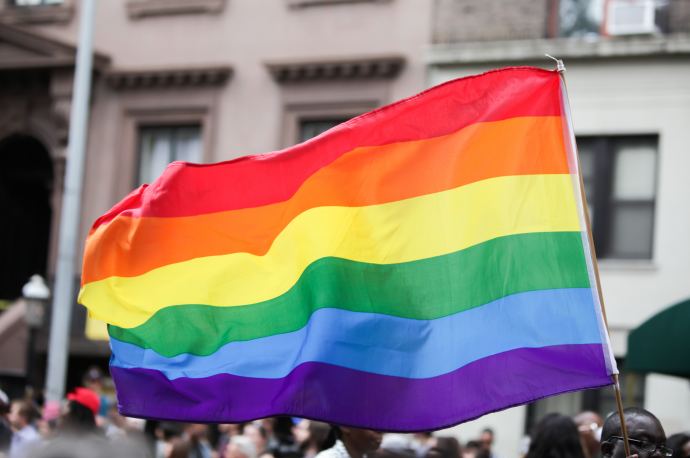
-
EFPA endorses the IPsyNet Statement on LGBTI rights and psychology
In June 2018, at the International Congress of Applied Psychology in Montreal, Canada, the International Psychology Network for Lesbian, Gay, Bisexual, Transgender and Intersex Issues ( IPsyNet) released a seven-paragraph position statement advocating for the human rights of and affirmative health care for sexual and gender minority people.
The IsyNet was formed in 2005 and is composed of national, multinational and international psychological associations. The mission of the IPsyNet is to facilitate and support the contributions of psychological organizations to the global understanding of human sexual and gender diversity, to the health and well-being of people around the world who identify as lesbian, gay, bisexual, transgender, transsexual or intersex (LGBTI), and to the full enjoyment of human rights by people of all sexual orientations, gender expressions, gender identities and sex characteristics.
The statement has been endorsed so far by 38 national psychology organizations representing all regions of the world and is available so far in 12 languages. Its purpose was to articulate shared transnational values of organized psychology and a growing global consensus of professional authority grounded in psychological science concerning sexual and gender minority people to inform practice and policy. In Summer 2020 EFPA has officially endorsed the statement.
As LGBTIQ+ identities and orientations are normative variations of human experience and are not diagnosable mental disorders per se, they do not require therapeutic interventions to change them. Given that conversion therapies actively stigmatize same-sex orientations and transgender identities, as well as have the potential for harm, we support affirmativeapproaches to therapy for LGBTQ+ people and reject therapies that aim to cause harm tothem.
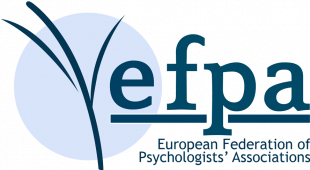

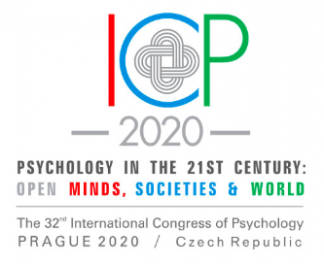
EFPA General Assembly, July 17-18, 2021
Some important deadlines:
March 17, 2021: Invitation to GA sent to Member associations
April 30, 2021: EFPA groups to deliver their activity report for the GA
May 17, 2021: MAs sending motions and items for agenda GA (e.g. bids for organizing ECP 2025, etc)
May 22, 2021: MAs nominating candidates for election (1 EC vacancy)
June 19, 2021: MAs nominating delegates to the GA
ICP 2020 Prague rescheduled to July 18-23, 2021
Important deadlines:
Website ICP
January 18, 2021: Deadline submission abstracts
February 20, 2021: Notification about abstract acceptance
March 1, 2021: Deadline registration for all presenters
April 1, 2021: Deadline Early bird registration
July 18, 2021: Opening ceremony ICP
July 23, 2021: Closing ceremony ICP
Nicosia e-symposium on Crisis, Trauma, and Disaster Psychology: Lessons from across Europe
October 9, 2020
By:
Anthi Loutsiou, PsyD, Department of Psychology, University of Cyprus, Cyprus Psychologists Association,
Magda Rooze, MA/MBA convenor Standing Committee Crisis, Disaster and Trauma Psychology EFPA, director Rooze Consultancy.
_w664_h380_1.png)
The “Nicosia e-symposium on Crisis, Trauma, and Disaster Psychology: Lessons from across Europe” took place with great success at the University of Cyprus on October 9th 2020 and was co-organized by the Cyprus Psychologists Association (CyPSA) and the Standing Committee on Crisis, Trauma and Disaster (SCCTD) of the European Federation of Psychologists Association (EFPA). Registration for the event was complementary in honor of the World Mental Health Day and the forty founding years of CyPSA. More than 250 participants from across Europe registered for the event, which was broadcasted live via a cloud-based video conferencing service.
The President of CyPSA Dr. Eleni Karayianni offered introductory remarks highlighting the need for collaboration across agencies and disciplines and the urgent need for investment in mental health at times of crisis such as the COVID-19 pandemic. The Chair of the SCCTD Magda Rooze highlighted the importance of the Standing Committee Crisis, Disaster and Trauma Psychology with 35 members representing 28 countries. The SC has her meetings twice a year and is aimed at exchanging expertise and lessons learned to support psychologists in the European countries in their work on crises, disasters and trauma. The meetings are combined with the organization of symposia in the hosting countries, which means a great opportunity to meet colleagues and learn from each other.
The e-symposium highlighted the need for the psychological response to crisis, disaster and trauma along three thematic areas and it included nine invited presentations by 11 speakers from Cyprus, Netherlands, Serbia, UK, and Spain. In the first theme “Supporting Vulnerable Groups" presenters introduced the role of ‘Citizenship Education And Social Emotional Learning To Prevent Radicalisation That Can Lead To Violent Behavior’ . They also highlighted the importance of “Supporting The Needs Of Children, Families, Schools And Communities After Critical And Trauma Incidents” and the need for “Community based psychosocial support: The role ofthe Cyprus Red Cross”.

In the second theme 'Psychological Impact of COVID-19 and War' there were two presentations highlighting the importance of research on the “Psychological Impact” and the need to focus on “The Role Of Psychological Surveillance In High Risk Roles” in organizational settings during the pandemic. Another discussed the “Specific Reactions To Trauma Among Serbs From Bosnia And Herzegovina”.
In the final theme SUPPORTING FIRST RESPONDERS the presenters introduced "The impact of crisis and trauma on police officers”, discussed the role of “Psychologists in Emergencies During The Pandemic: The Catalan Experience” and shared best practices for “ Psychological Resilience Among Fire and Rescue Officers in Cyprus”.
In her concluding remarks Dr. Anthi Loutsiou, Convener of the e-symposium and Representative of CyPSA to the SCCDT, noted that crisis, trauma and disaster calls upon all of us for multiagency, interdisciplinary, and cross-national collaboration. The e-symposium highlighted the need for continued partnership at a national and a European level towards mapping gaps and building more capacity towards preparedness for a psychological response to crisis, disaster and trauma that is driven by empirical evidence. Finally, there is also an ongoing need for psychologists to work together in the area of crisis, trauma, and disaster to identify already available assets and resources, develop specialized training, and strengthen synergies to help carry the voice of psychology to policy makers.
With permission the presentations from the Nicosia e-symposium are available online at the website of the Cyprus Psychologists Association
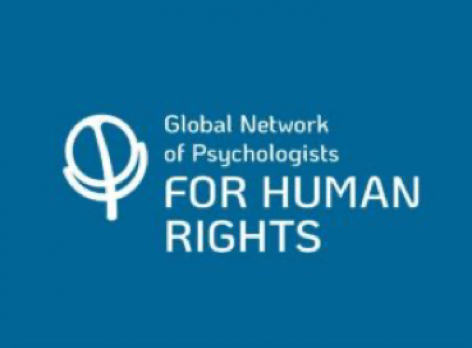
The GNPHR is a joint initiative of the EFPA Board Human Rights and Psychology together with the International Council of Psychologists ( ICP).
Its mission is to promote a human rights-based and oriented psychology, based on the values of the Universal Declaration of Human Rights and other global human rights documents.
It provides an independent global platform for psychologists concerned about human rights.It has a web resource that curates material, publishes articles and blogs, publicises events and actions, and reports news on the crossroads of psychology and human rights.
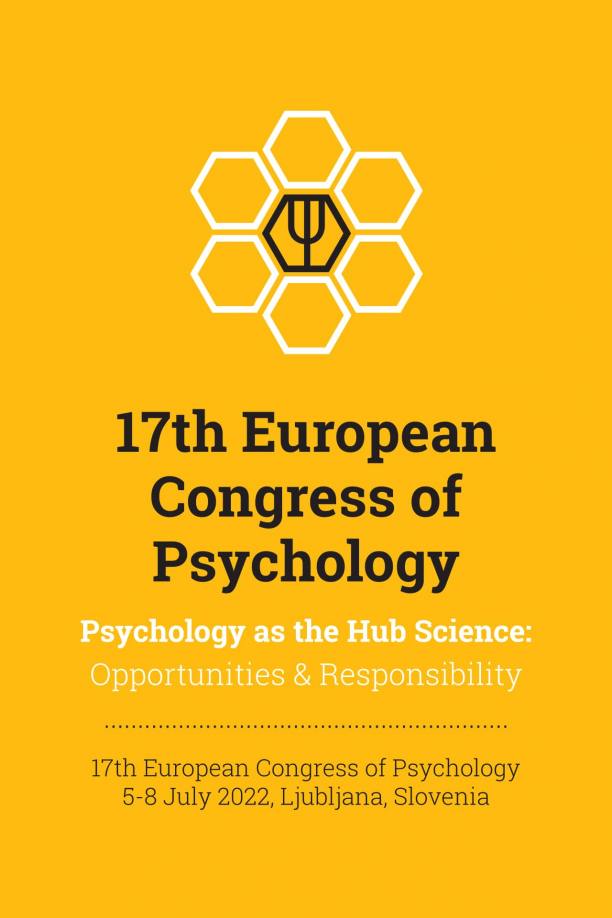
Submit abstract

Follow us on


